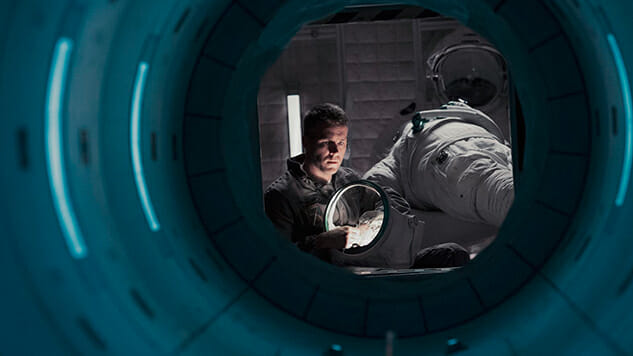
Suppose you’re in Space. Go ahead, suppose it. Now suppose you’re on a Spacewalk, nothing between you and the infinite but a braided steel tether and the best Spacesuit human minds could fathom. Then something goes wrong. Your helmet starts filling up with liquid and you don’t know why. In Space, the liquid is everywhere, floating in your eyes, blinding you.
This actually happened to astronauts Chris Hadfield and Luca Parmitano, when emergency suit leaks almost caused disaster. They didn’t panic—but they’re not us. Life, a gripping space station horror movie somewhere between The Martian, Alien and Event Horizon, uses this scientific unfamiliarity to its terrifying advantage.
There’s already so much extra to consider in Space, so much outside the layman’s understanding, that there’s also so much extra to fear. We’re afraid of things we can’t quite grasp, and in Space we’re sure of so little that, when done well, weightless—metaphorically and literally—events can feel like lead in our stomachs. And Life nails the fundamentals of that fear.
The film establishes its small, multi-hyphenate crew of International Space Station (ISS) astronauts, waiting on the return of a Mars probe, briskly and elegantly: Roy Adams (Ryan Reynolds), the mechanically-inclined motormouth; Dr. David Jordan (Jake Gyllenhaal), the isolation-loving oddball; Dr. Miranda North (Rebecca Ferguson), the hard-nosed security officer; Hugh Derry (Ariyon Bakare), the overly-enthused biologist; Sho Kendo (Hiroyuki Sanada), the operations-savvy new father; and Katerina Golovkina (Olga Dihovichnaya), their stony Russian captain. When they receive the probe—and the small cellular lifeform hiding inside its Martian dirt samples—we already know everyone before everything goes wrong.
All give excellent performances on sparse dialogue, deriving vulnerability and strength from their complex loves of Space and being in it. While Ferguson, Gyllenhaal and Reynolds all make cases that they should continue to lead weird genre movies, the real breakout in Life is Bakare. Derry’s carelessness, driven by obsession (grown, the movie implies, from the character’s physical disability and his subsequent over-compensatory attitude) instigates the film’s devolvement from Space discovery to creature feature. He gets too close to the rapidly growing alien (which the Earth dubs “Calvin” in a believably cute expository scene involving a raffle among elementary schools) and it breaks its containment. Said alien can absorb and morph other carbon-based cells into its form, growing each time it feeds, its every cell a muscle, a nerve and a photoreceptor. As one of the astronauts comments, “It’s all muscle, brain and eyes.” Think Flubber combined with the horrible faceless snakes from Prometheus and you’ll get a sense of the almost-goofy menace Calvin represents.
Life’s creature effects shift from cute to unsettling on a dime, demonstrating director Daniel Espinosa’s perfect handling of the balance between CGI spectacle and the on-point screenwriting of Rhett Reese and Paul Wernick, keeping us paralyzed. The alien’s attacks and movements are plot-driven, which is the best kind of horror violence we should expect from a movie like this.
Life is also just a generally beautiful movie whose visuals embrace both the wonders of technology and the intensity of isolation—not by, like Alfonso Cuarón does in Gravity, opening up to the cold loneliness of space, but instead by countering gorgeously rendered ISS shots with an Earthly backdrop. Espinosa emphasizes the responsibility placed on the space station by all of us here on the ground. Those astronauts are the best of us and, dammit, they’re not going to let us down.
That responsibility slowly grows large in the survivors’ minds as they start to be (gorily and excitingly) picked off by Calvin, their instincts turning from singular escape to heroic martyrdom. Life may have a few logistical plot holes—set in Space, it’s hard not to—but the emotional core of the film is sound. Aside from a few overly shaky sequences in which the camera angles and editing conspire awkwardly against us to hide the action (and not in the smart, sneaky way low-budget horror does to unsettle us, but in an accidental way that cripples its big moments), the film simply won’t let you think too hard about its creation, nor its details. Rather, it’ll have you wringing your sweaty hands, thankful they’re not encased in powerful Martian tentacles. Similarly, the creatively scary film’s purposefully misleading ending is fun in a cruel kind of way, especially coming from a horror that’s already put us through so much. Alas, such is Life.
Director: Daniel Espinosa
Writer: Rhett Reese and Paul Wernick
Starring: Ryan Reynolds, Jake Gyllenhaal, Rebecca Ferguson, Ariyon Bakare, Hiroyuki Sanada
Release Date: March 24, 2017